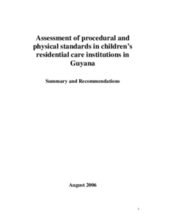The Convention on the Rights of the Child (ratified by Guyana in 1991) clearly states that the institution will act as the last resort of care for vulnerable children when all other options have been exhausted. However, finding and strengthening alternatives to institutional care, such as adequate community-based care or formalised foster care have not yet been given sufficient attention and there is presently a lack of such alternatives in Guyana. Once a child is orphaned or without caregivers, it is up to the State to take responsibility for the child by ensuring the most adequate environment is found but in many cases, due to the lack of care options for children without (adequate) parental care, institutionalisation becomes the only resort for the child’s immediate protection.
The Ministry of Labour, Human Services and Social Security (MoLHSSS) has the role of identifying and monitoring the situation of children who are vulnerable. They also have a role in the coordination of responses for such children including providing social work assistance to vulnerable children and their families. Part of this work includes the identification and support of children without parental care (in child residential institutions) or children at risk of losing parental care (in families who suffer from break-down).
Presently the MoLHSSS has no legal or normative framework with which it works with institutions. There are no standards that can be regulated and no means of measuring the level of care and protection being provided by these institutions to children. Due to these gaps, it is possible for children in institutions to go without necessary social work, lack family contact, be transferred from one institution to another and sometimes live in conditions that are not in the best interest of the child. All of this can happen without the knowledge or input from the MoLHSSS. There is a need for more involvement of the Ministry in the welfare of these children including to be able to regulate standards in institutions should they not be in the best interest of the child. Standards must first and foremost be applied to the Ministry’s own institutions.
In some cases, children placed in child residential institutions have families who cannot care for them for financial reasons. Due to the inability to provide sufficiently for a child, s/he may be placed in a residential care institution for an undetermined time. Child residential institutions are currently providing a necessary and important response to children without parental care but their response is usually limited to the boundaries of the institution itself. Social work for vulnerable children to reconnect with their families is one of the most important components of supporting a community based system of child care and those children living in residential care institutions and their families would benefit from access to consistent and quality social work.
This research is one component of a larger programme being conducted by the MoLHSSS and will contribute to providing essential information on the cases of children without adequate parental care (in institutional care) for planning appropriate programmes and improving social services for vulnerable children. It will also contribute towards the development of minimum standards and regulations. This programme has been guided by the wider National Policy framework for orphans and vulnerable children (OVC) in Guyana (2006).
In view of the principle that children are better placed in a family environment, the recommendations are that wherever possible and with assistance to households, reintegration of children is of priority. Of equal priority is the increased role and capacity of social workers and the MoLHSSS in monitoring, following and attending to all cases of children in institutional care; those who are vulnerable to institutional care and those who need to be reintegrated back to families in need of additional support. Meanwhile, institutions need to improve their physical and operational standards to ensure that all children residing in their institutions are claiming their rights to care and protection.

